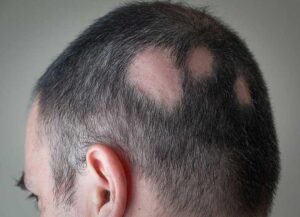Understanding the difference between alopecia vs hair loss can be confusing. Many people misuse the word alopecia. Alopecia is just the medical term for hair loss or balding–and there are several types.

Alopecia is not just alopecia areata
When many use the term alopecia, they are referring to a specific type of hair loss called alopecia areata. Alopecia areata is an autoimmune condition in which smooth, often circular, patches of hair loss suddenly appear. The cause of this condition is that the body’s immune system mistakenly attacks hair follicles. Alopecia areata affects the scalp, but also facial and body hair. When this type of alopecia causes balding of the entire scalp, we use the term alopecia totalis. When all the body hair falls out we use the term alopecia universalis.
Other types of “alopecia”
But, in addition to alopecia areata, and its variations, there are other types of hair loss and those that carry the word alopecia in their name. Androgenetic alopecia, also know as balding, male pattern or female pattern hair loss, is one of the most common types of alopecia and it runs in families. Traction alopecia occurs when tight or heavy hair styles cause physical trauma leading to hair breakage and loss. Scarring alopecia, on the other hand, is a whole category of hair loss where hair loss occurs due to scarring of the scalp, which damages hair follicles and prevents hair from growing back. Types of scarring alopecia include frontal fibrosing alopecia, and central centrifugal cicatricial alopecia.
Watch: What are the causes of hair loss?
Hair loss that doesn’t carry the name “alopecia”
There are other types of hair loss that don’t include the word alopecia, or even hair loss in their names. These would include telogen effluvium, lichen planopilaris or LPP, tinea capitis, ophiasis (a subtype of alopecia areata), discoid lupus, folliculitis decalvans and more.
In conclusion
Hair loss is a problem that affects millions of people at some point in their lifetimes. Alopecia is a medical term for hair loss of all types–not just alopecia areata. Whether one uses the term alopecia vs hair loss, understanding that there are many types and causes of alopecia is essential to choose the right treatment for the condition. If you are experiencing hair loss, schedule a consult here with our hair loss dermatologist to determine the underlying cause of the condition and develop a treatment plan.


